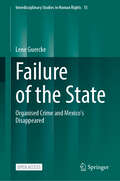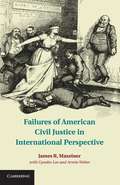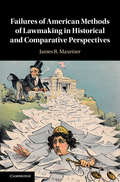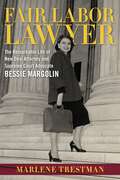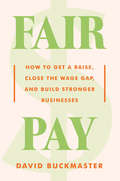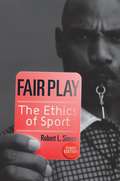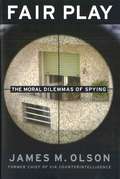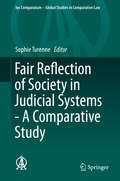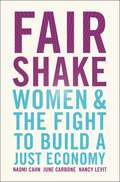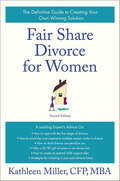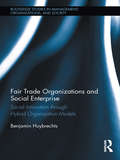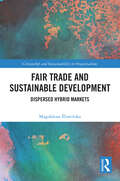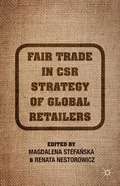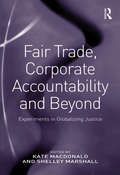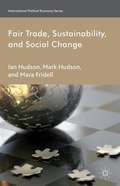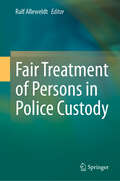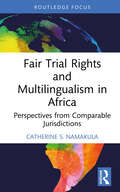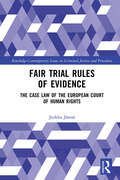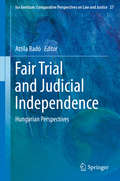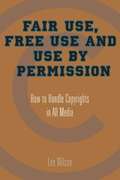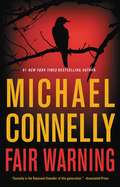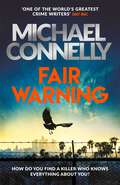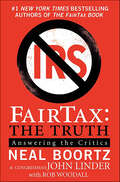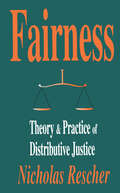- Table View
- List View
Failure of the State: Organised Crime and Mexico's Disappeared (Interdisciplinary Studies in Human Rights #15)
by Lene GuerckeThis Open Access book explores an issue that has received little attention in human rights research: organised criminal groups (OCGs) as perpetrators of human rights violations, especially disappearances. It takes an interdisciplinary approach, combining doctrinal legal research with a qualitative study on present-day disappearances in Mexico. Disappearances are a complex human rights violation that impacts not only the disappeared person but also their relatives, who are left in a limbo of uncertainty about their loved one’s fate. Originally part of state-led repression, today disappearances occur in varied contexts, often involving OCGs and other non-state actors. However, disappearances committed by non-state actors are not human rights violations under International Human Rights Law (IHRL), thereby potentially leaving a gap in the legal protection of victims. The book first analyses state obligations and case law involving state responsibility for human rights violations committed by non-state actors and applies the analysis to OCGs. This ‘internal’ legal perspective is complemented by an ‘external’ study based on interviews with human rights practitioners working on disappearances in Mexico, which often involve OCGs. The qualitative study offers a unique perspective on human rights protection ‘in reality’. The book adds to scholarship on non-state actors and disappearances, and to incipient international legal scholarship on the issue of organised crime and international law. Moreover, the study on Mexico provides a richer understanding of challenges faced by practitioners ‘on the ground’ where OCGs commit human rights violations alongside, or in collusion with, state forces and against the backdrop of an overall failure of the state. The book may be of interest to a diverse audience, including legal scholars and practitioners, human rights scholars in fields such as political science, international relations, or socio-legal studies, as well as funders supporting the work of NGOs in Mexico and similar contexts, and NGOs themselves.
Failures of American Civil Justice in International Perspective
by Gyooho Lee Armin Weber James R. MaxeinerThis book provides a comparative-critical introduction to civil justice systems in the United States, Germany, and Korea.
Failures of American Methods of Lawmaking in Historical and Comparative Perspectives
by Philip K. Howard James R. MaxeinerIn this book, James R. Maxeiner takes on the challenge of demonstrating that historically American law makers did consider a statutory methodology as part of formulating laws. In the nineteenth century, when the people wanted laws they could understand, lawyers inflicted judge-made, statute-destroying, common law on them. Maxeiner offers the cure for common law, in the form of sensible statute law. Building on this historical evidence, Maxeiner shows how rule-making in civil law jurisdictions in other countries makes for a far more equitable legal system. Sensible statute laws fit together: one statute governs, as opposed to several laws that even lawyers have trouble disentangling. In a statute law system, lawmakers make laws for the common good in sensible procedures, and judges apply sensible laws and do not make them. This book shows how such a system works in Germany and would be a solution for the American legal system as well.
Fair Labor Lawyer: The Remarkable Life of New Deal Attorney and Supreme Court Advocate Bessie Margolin (Southern Biography Series)
by Marlene TrestmanThrough a life that spanned every decade of the twentieth century, Supreme Court advocate Bessie Margolin shaped modern American labor policy while creating a place for female lawyers in the nation's highest courts. Despite her beginnings in an orphanage and her rare position as a southern, Jewish woman pursuing a legal profession, Margolin became an important and influential Supreme Court advocate. In this comprehensive biography, Marlene Trestman reveals the forces that propelled and the obstacles that impeded Margolin's remarkable journey, illuminating the life of this trailblazing woman. Raised in the Jewish Orphans' Home in New Orleans, Margolin received an extraordinary education at the Isidore Newman Manual Training School. Both institutions stressed that good citizenship, hard work, and respect for authority could help people achieve economic security and improve their social status. Adopting these values, Margolin used her intellect and ambition, along with her femininity and considerable southern charm, to win the respect of her classmates, colleagues, bosses, and judges -- almost all of whom were men. In her career she worked with some of the most brilliant legal professionals in America.A graduate of Tulane and Yale Law Schools, Margolin launched her career in the early 1930s, when only 2 percent of America's attorneys were female, and far fewer were Jewish and from the South. According to Trestman, Margolin worked hard to be treated as "one of the boys." For the sake of her career, she eschewed marriage -- but not romance -- and valued collegial relationships, never shying from a late-night brief-writing session or a poker game. But her personal relationships never eclipsed her numerous professional accomplishments, among them defending the constitutionality of the New Deal's Tennessee Valley Authority, drafting rules establishing the American military tribunals for Nazi war crimes in Nuremberg, and, on behalf of the Labor Department, shepherding through the courts the child labor, minimum wage, and overtime protections of the Fair Labor Standards Act of 1938. A founding member of that National Organization for Women, Margolin culminated her government service as a champion of the Equal Pay Act, arguing and winning the first appeals. Margolin's passion for her work and focus on meticulous preparation resulted in an outstanding record in appellate advocacy, both in number of cases and rate of success. By prevailing in 21 of her 24 Supreme Court arguments Margolin shares the elite company of only a few dozen women and men who attained such high standing as Supreme Court advocates.
Fair Pay: How to Get a Raise, Close the Wage Gap, and Build Stronger Businesses
by David BuckmasterLonglisted for the 2021 Porchlight Business Book Awards, Management & Workplace CultureAn expert takes on the crisis of income inequality, addressing the problems with our current compensation model, demystifying pay practices, and providing practical information employees can use when negotiating their salaries and discussing how we can close the gender and racial pay gap.American workers are suffering economically and fewer are earning a living wage. The situation is only worsening. We do not have a common language to talk about pay, how it works at most companies, or a cohesive set of practical solutions for making pay more fair. Most blame the greed of America’s executive class, the ineptitude of government, or a general lack of personal motivation. But the negative effects of income inequality are a problem that can be solved. We don’t have to choose between effective government policy and the free market, between the working class and the job creators, or between socialism and capitalism, David Buckmaster, the Director of Global Compensation for Nike, argues. We do not have to give up on fixing what people are paid. Ideas like Universal Basic Income will not be enough to avoid the severe cultural disruption coming our way.Buckmaster examines income inequality through the design and distribution of income itself. He explains why businesses are producing no meaningful wage growth, regardless of the unemployment rate and despite sitting on record piles of cash and the lowest tax rates[0] in a generation . He pulls back the curtain on how corporations make decisions about wages and provides practical solutions—as well as the corporate language—workers need to get the best results when talking about money with a boss. The way pay works now will not overcome our most persistent pay challenges, including low and stagnant wages, unequal pay by race and gender, and executive pay levels untethered from the realities of the average worker. The compensation system is working as designed, but that system is broken. Fair Pay opens the corporate black box of pay decisions to show why businesses pay what they pay and how to make them pay more.
Fair Play
by Robert L. SimonIn this updated third edition, Simon (philosophy, Hamilton College) provides a philosophical analysis of the ethics of competitive athletics. A critique of moral and ethical relativism is offered in the introductory chapter in order to establish the justifiability of moral judgments made in subsequent sections. Simon defends competition against its critics as being, ideally, a "mutual quest for excellence," as opposed to a mere manifestation of selfishness, and he applies internal and external hypotheses as regards the origin of sports morality to particular issues of sportsmanship and fairness. New to the third edition is an examination of genetic enhancement and sports. Other moral and ethical issues and dilemmas explored include the use of performance-enhancing drugs, gender equity in sports, the commercialization of sports, violence, collegiate athletics, and the role of sports in moral education. Annotation ©2011 Book News, Inc. , Portland, OR (booknews. com)
Fair Play
by Robert L. SimonAddressing both collegiate and professional sports, the updated edition of Fair Play explores the ethical presuppositions of competitive athletics and their connection both to ethical theory and to concrete moral dilemmas that arise in actual athletic competition. A major new section in chapter four examines the ethics of genetically enhancing athletic abilities. Other new material covers the analysis of sports and games according to influential philosopher Bernard Suits; the morality of cheating and the ethics of strategic fouling; and the impact of performance-enhancing drugs on the legitimacy of records. In addition, Simon provides enhanced considerations of the morality of competition in sports, the ethical aspects of violence in sports, and the arguments in defense of intercollegiate sports.
Fair Play: The Moral Dilemmas Of Spying
by James M. OlsonRevolutionary War officer Nathan Hale, one of America’s first spies, said, “Any kind of service necessary to the public good becomes honorable by being necessary.” A statue of Hale stands outside CIA headquarters, and the agency often cites his statement as one of its guiding principles. But who decides what is necessary for the public good, and is it really true that any kind of service is permissible for the public good? <p><p> These questions are at the heart of James M. Olson’s book, Fair Play: The Moral Dilemmas of Spying. Olson, a veteran of the CIA’s clandestine service, takes readers inside the real world of intelligence to describe the difficult dilemmas that field officers face on an almost daily basis. Far from being a dry theoretical treatise, this fascinating book uses actual intelligence operations to illustrate how murky their moral choices can be. Readers will be surprised to learn that the CIA provides very little guidance on what is, or is not, permissible. Rather than empowering field officers, the author has found that this lack of guidelines actually hampers operations. Olson believes that U.S. intelligence officers need clearer moral guidelines to make correct, quick decisions. Significantly, he believes these guidelines should come from the American public, not from closed-door meetings inside the intelligence community. Fair Play will encourage a broad public debate about the proper moral limits on U.S. intelligence activities.
Fair Reflection of Society in Judicial Systems - A Comparative Study
by Sophie TurenneThis book addresses one central question: if justice is to be done in the name of the community, how far do the decision-makers need to reflect the community, either in their profile or in the opinions they espouse? Each contributor provides an answer on the basis of a careful analysis of the rules, assumptions and practices relating to their own national judicial system and legal culture. Written by national experts, the essays illustrate a variety of institutional designs towards a better reflection of the community. The involvement of lay people is often most visible in judicial appointments at senior court level, with political representatives sometimes appointing judges. They consider the lay involvement in the judicial system more widely, from the role of juries to the role of specialist lay judges and lay assessors in lower courts and tribunals. This lay input into judicial appointments is explored in light of the principle of judicial independence. The contributors also critically discuss the extent to which judicial action is legitimised by any 'democratic pedigree' of the judges or their decisions. The book thus offers a range of perspectives, all shaped by distinctive constitutional and legal cultures, on the thorny relationship between the principle of judicial independence and the idea of democratic accountability of the judiciary.
Fair Shake: Women and the Fight to Build a Just Economy
by June Carbone Naomi Cahn Nancy LevitA stirring, comprehensive look at the state of women in the workforce—why women&’s progress has stalled, how our economy fosters unproductive competition, and how we can fix the system that holds women back.In an era of supposed great equality, women are still falling behind in the workplace. Even with more women in the workforce than in decades past, wage gaps continue to increase. It is the most educated women who have fallen the furthest behind. Blue-collar women hold the most insecure and badly paid jobs in our economy. And even as we celebrate high-profile representation—women on the board of Fortune 500 companies and our first female vice president—women have limited recourse when they experience harassment and discrimination. Fair Shake: Women and the Fight to Build a Just Economy explains that the system that governs our economy—a winner-take-all economy—is the root cause of these myriad problems. The WTA economy self-selects for aggressive, cutthroat business tactics, which creates a feedback loop that sidelines women. The authors, three legal scholars, call this feedback loop &“the triple bind&”: if women don&’t compete on the same terms as men, they lose; if women do compete on the same terms as men, they&’re punished more harshly for their sharp elbows or actual misdeeds; and when women see that they can&’t win on the same terms as men, they take themselves out of the game (if they haven&’t been pushed out already). With odds like these stacked against them, it&’s no wonder women feel like, no matter how hard they work, they can&’t get ahead. Fair Shake is not a &“fix the woman&” book; it&’s a &“fix the system&” book. It not only diagnoses the problem of what's wrong with the modern economy, but shows how, with awareness and collective action, we can build a truly just economy for all.
Fair Share Divorce for Women: The Definitive Guide to Creating Your Own Winning Solution
by Kathleen MillerMore than 1.1 million women are actively involved in divorce each year and all need solid financial advice to help make this transition less painful. In Fair Share Divorce for Women, Second Edition, Certified Financial Planner Kathleen Miller has created a comprehensive guide to help you completely integrate all the financial aspects of your divorce into a personalized and sound financial plan. This completely revised and expanded second edition includes updated statistics, recent case studies that reflect modern marriages, complete indexing, and a comprehensive appendix of resources. Kathleen Miller has added new topics and chapters, including:-Current economic impacts on retirement and benefits planning-Dealing with a disparity of earnings post-divorce -Career planning and maintenance strategies business valuation-Succession long-term care and other insurance provisions-Child support and parenting plans-Pre-and post-nuptial and cohabitation agreements Grounded in the experiences of her more than 3,000 clients, Kathleen Miller's advice is clear and concise. Fair Share Divorce for Women , Second Edition will offer you the guidance and support you need to safeguard your marital assets, and will empower you to take control of your divorce and financial future.
Fair Trade Organizations and Social Enterprise: Social Innovation through Hybrid Organization Models (Routledge Studies in Management, Organizations and Society)
by Benjamin HuybrechtsFor several decades, social enterprises have been pioneers in the conception and implementation of a pathbreaking social innovation: Fair Trade (FT). Fair Trade Social Enterprises have created a movement which has challenged mainstream trading practices and offered development opportunities for disadvantaged producer groups in the South. Starting from a niche market aimed at convinced customers, FT has expanded and entered mainstream retailing outlets, growing in visibility and market share, while simultaneously experiencing diversification of its organization models. While pioneer Fair Trade Social Enterprises in the early years were largely nonprofit organizations relying on voluntary work, they have become increasingly diversified in terms of legal forms, governance models and organizational practices. These diversified models seem to reflect the hybrid nature of FT itself, through different ways of combining a commercial activity (trading of FT products), a social mission (support to producers), and an explicit or implicit political message (often expressed through education and advocacy). Based on the study of Fair Trade Social Enterprises across Europe, this book builds a typology of organization models for FT. Author Benjamin Huybrechts further examines how the different organization models combine the economic, social, and political dimensions of FT, and how they manage the possible tensions between these dimensions. Fair Trade Organizations and Social Enterprise proposes a range of theoretical approaches to interpret the diversity of Fair Trade Social Enterprises and offers concrete avenues for managing social enterprises and hybrid organizations in general.
Fair Trade and Sustainable Development: Dispersed Hybrid Markets (Citizenship and Sustainability in Organizations)
by Magdalena ŚliwińskaFair Trade constitutes a social-business initiative that plays a crucial role in the transition towards a "sustainable market economy", countering the major challenges of the 21st century. This research monograph reveals the mechanisms behind this process. It argues that Fair Trade constitutes a new type of market, "a Dispersed Hybrid Market (DHM)", that due to its specific features contributes to a more pro-social functioning of the entire market and taking responsibility for sustainable development by different market participants. It demonstrates, thus, what was underestimated about Fair Trade, and which is extremely important, that it can have a positive impact on the market in terms of sustainable transformation. The book is intended for researchers, lecturers, students, practitioners, and political decision-makers interested in sustainable development, Fair Trade, and transition towards sustainable markets, business, and economy. It contributes to better understanding of sustainability challenges explaining specifics of Fair Trade market, revealing paradoxes and barriers of its development and showing mechanisms of its spillover effects. It also develops arguments about the need to change the role of the state in the face of global challenges and to support such grassroots international initiatives as Fair Trade. Therefore the practical recommendations address both the desired directions of development of the self-governance of this initiative and the expected role of the state towards it, in particular possible ways to strengthen it.
Fair Trade in CSR Strategy of Global Retailers
by Magdalena Stefańska Renata NestorowiczFair Trade In CSR Strategy of Global Retailers shows how retailers can improve the success of their fair trade strategy. Using Polish market research, the authors analyze the aggressive and detrimental competition between retailers such as Ikea, and Tesco to emphasize the benefits of CSR strategy for stakeholders and society at large.
Fair Trade, Corporate Accountability and Beyond: Experiments in Globalizing Justice
by Shelley MarshallAs trade and production have increasingly crossed international boundaries, private bodies and governments alike have sought new ways to regulate labour standards and advance goals of fairness and social justice. Governments are harnessing social and market forces to advance corporate accountability, while private bodies are employing techniques drawn from command and control regulation to shape the behaviour of business. This collection brings together the research and reflections of a diverse international mix of academics, activists and practitioners in the fields of fair trade and corporate accountability, representing perspectives from both the industrialized and developing worlds. Contributors provide detailed case studies of a range of social justice governance initiatives, documenting the evolution of established strategies of advocacy and social mobilization, and evaluating the strengths and limitations of voluntary initiatives compared with legally enforceable instruments.
Fair Trade, Sustainability, and Social Change
by Mark Hudson Ian Hudson Mara FridellThe authors critically evaluate the fair trade movement's role in pursuing a more just and environmentally sustainable society. Using fair trade as a case study of the shift toward non-state forms of governance, they focus on its role not only as a regulatory tool, but as a catalyst for broader social and political transformation.
Fair Treatment of Persons in Police Custody
by Ralf AlleweldtThis book analyses and evaluates the international efforts to ensure the fair and human treatment of persons in police custody. Respecting the dignity of all detained persons, and in particular preventing torture, is a key issue of international human rights protection. The authors explore various approaches to tackle this issue, including the introduction of investigative, non-coercive interviewing techniques as well as the implementation of fundamental safeguards such as the access to a lawyer and a doctor. Supported by case studies, they describe the special role of national preventive mechanisms and the efforts to improve the treatment of detainees in the context of capacity building activities. Police components of international peace missions face special legal and practical human rights challenges. Authors also ask how the positive potentials and strengths within police organisations could be mobilised for realising human rights, and, last but not least, they seek to assess the prospects of how fair treatment of persons in police custody may be ensured in the future effectively.
Fair Trial Rights and Multilingualism in Africa: Perspectives from Comparable Jurisdictions (Law, Language and Communication)
by Catherine S. NamakulaThis book examines the best language fair trial practices of the courts in arguably the most multilingual region of the world. It contains an instructive list of standards and approaches to linguistic dynamics, which may be considered a language fair trial rights code. By way of jurisprudential analysis and scrutiny of constitutional imperatives and examination of legislation among the respective jurisdictions from the Sahel region, to the Horn of Africa, and the Cape, this publication presents peculiar country-specific practices and common standards aiming towards the realisation of a fair trial in a multilingual context. The exceptionally multilingual nature of legal processes in Africa makes the standards in the region instructive in the progression towards a universal language fair trial rights code. The book reveals valuable lessons across jurisdictions, including those outside Africa, and suggests measures that may be taken to improve existing approaches. It will be a valuable resource for academics, researchers, and policy-makers working in the areas of Law and Language, Legal Linguistics, Forensic Linguistics, Criminal Justice, and Comparative Law.
Fair Trial Rules of Evidence: The Case Law of the European Court of Human Rights (Routledge Contemporary Issues in Criminal Justice and Procedure)
by Jurkka JämsäThis book examines how the European Court of Human Rights approaches the matter of evidence, and how its judgments affect domestic law.The case law of the Court has affected many areas of law in Europe. One of these areas is the law of evidence, and especially criminal evidence. This work examines the key defence rights that may touch upon evidence, such as the right to adduce evidence, the right to disclosure, the privilege against self-incrimination and access to a lawyer, entrapment, and the right to cross-examine prosecution witnesses. It explains the relevant assessment criteria used by the Court and introduces a simple framework for understanding the various assessment models developed by the Court, including "the Perna test", "the Ibrahim criteria", and "the sole or decisive rule".The book provides a comprehensive overview on the relevant case law, and will be a valuable asset for students and researchers, as well as practitioners, such as judges, prosecutors, and lawyers, working in the areas of criminal procedure and human rights.
Fair Trial and Judicial Independence
by Attila BadóThis comprehensive publication analyzes numerous aspects of the relationship between judicature and the fair trial principle in a comparative perspective. In addition, it examines the manifestation of some of the most significant elements inherent to the fair trial concept in different legal systems. Along with expansion of judicial power during the past century and with the strengthening of judicial independence, the fair trial requirement has appeared more often, especially in different international agreements and national constitutions, as the summarizing principle of what were formerly constitutional principles pertaining to judicature. Despite its generality and supranational application, the methods of interpreting this clause vary significantly among particular legal systems. This book assumes that the substantive content of this term conveys relevance to the organizational independence of judicial power, the selection of judges, and the mutual relationship between the branches of power. The comparative studies included in this collection offer readers a widespread understanding of the aforementioned correlations and will ultimately contribute to their mastery of the concept of fair trial.
Fair Use, Free Use, and Use by Permission: How to Handle Copyrights in All Media
by Lee WilsonWho needs this book? Only every writer, photographer, illustrator, designer, businessperson, musician, songwriter, filmmaker, teacher, researcher, advertiser, and Web designer in the United States How to find copyright owners, request permissions, and keep records Easy-reference copyright duration chart, form agreements, form letters, resources, and checklistsPermissions-they're enough to make anyone crazy. Thank heavens there's Fair Use, Free Use and Use by Permission, the one-volume reference that is sure to save the sanity of thousands of grateful readers. Writers, photographers, illustrators, designers, teachers, researchers-anyone involved with intellectual property needs this practical, straightforward guide to copyright law. Find out what constitutes fair use, how to get permissions, and how to protect creative work, plus learn about copyright infringement, public domain, and much more. Illuminating true-life stories enliven the ins and outs of copyright law, and helpful charts, resource lists, and forms make the permissions experience vastly more manageable. Let a respected intellectual property lawyer show the way through the copyright maze!
Fair Warning (Jack McEvoy #3)
by Michael ConnellyThe hero of The Poet and The Scarecrow is back in the new thriller from #1 New York Times bestselling author Michael Connelly. <P><P>Jack McEvoy, the journalist who never backs down, tracks a serial killer who has been operating completely under the radar--until now. Veteran reporter Jack McEvoy has taken down killers before, but when a woman he had a one-night stand with is murdered in a particularly brutal way, McEvoy realizes he might be facing a criminal mind unlike any he's ever encountered. <P><P>Jack investigates--against the warnings of the police and his own editor--and makes a shocking discovery that connects the crime to other mysterious deaths across the country. Undetected by law enforcement, a vicious killer has been hunting women, using genetic data to select and stalk his targets. <P><P>Uncovering the murkiest corners of the dark web, Jack races to find and protect the last source who can lead him to his quarry. But the killer has already chosen his next target, and he's ready to strike.Terrifying and unputdownable, Fair Warning shows once again why "Michael Connelly has earned his place in the pantheon of great crime fiction writers" (Chicago Sun-Times). <P><P><b>A New York Times Bestseller</b>
Fair Warning: The Instant Number One Bestselling Thriller
by Michael ConnellyHOW DO YOU FIND A KILLER WHO KNOWS EVERYTHING ABOUT YOU?THE INSTANT NUMBER ONE BESTSELLER'AS EXCITING AS ANYTHING CONNELLY HAS WRITTEN' THE TIMES'UTTERLY COMPELLING ... THIS IS CONNELLY AT THE PEAK OF HIS POWERS' MAIL ON SUNDAY* * * *Jack McEvoy is a reporter with a track record in finding killers. But he's never been accused of being one himself.Jack went on one date with Tina Portrero. The next thing he knows, the police are at his house telling Jack he's a suspect in her murder.Maybe it's because he doesn't like being accused of a crime he didn't commit. Or maybe it's because the method of her murder is so chilling that he can't get it out of his head.But as he uses his journalistic skills to open doors closed to the police, Jack walks a thin line between suspect and detective - between investigation and obsession - on the trail of a killer who knows his victims better than they know themselves... Riveting, original and terrifying - this masterpiece from Michael Connelly is the best thriller you will read this summer.* * * * *CRIME DOESN'T COME BETTER THAN CONNELLY.'One of the very best writers working today in any genre' Sunday Telegraph'The pre-eminent detective novelist of his generation' Ian Rankin'Crime thriller writing of the highest order' Guardian'A superb natural storyteller' Lee Child'A master' Stephen King'A genius' Independent on Sunday'America's greatest living crime writer' Daily Express'No one writes a better modern thriller than Connelly' Evening Standard
FairTax: Answering the Critics
by Neal Boortz John Linder Rob WoodallThe author of the #1 New York Times bestseller The FairTax Book offers a new look at the fast-growing populist tax reform movement that’s poised to become a key campaign issue for 2008In 2005, firebrand radio talk show host Neal Boortz and Georgia congressman John Linder teamed up to create The FairTax Book, the first book devoted to the FairTax movement they had been promoting for years. Riding the growing groundswell of popular support for the tax reform measure, The FairTax Book became an overnight sensation. As the election season heats up, Boortz and Linder return to add fuel to the fire with this radical follow-up. Talking back to the critics who have grossly misrepresented the simple principles behind the tax reform measure—which would abolish the IRS and replace it with a 23 percent retail sales tax on all new goods and services—Boortz and Linder: • Debunk myths about the tax and answer critical charges—that it would bankrupt the economy, that it would leave poor people in the lurch, that the math doesn’t work• Offer new insights into aspects of the plan not originally covered • Show the American voter that there’s still hope of replacing our currently outdated, corrupt,and punitive income tax system with a simple plan that will revolutionize the way American pays for itself.
Fairness
by Nicholas RescherIn theory and practice, the notion of fairness is far from simple. The principle is often elusive and subject to confusion, even in institutions of law, usage, and custom. In Fairness, Nicholas Rescher aims to liberate this concept from misunderstandings by showing how its definitive characteristics prevent it from being absorbed by such related conceptions as paternalistic benevolence, radical egalitarianism, and social harmonization. Rescher demonstrates that equality before the state is an instrument of justice, not of social utility or public welfare, and argues that the notion of fairness stops well short of a literal egalitarianism.Rescher disposes of the confusions arising from economists' penchant to focus on individual preferences, from decision theorists' concern for averting envy, and from political theorists' sympathy for egalitarianism. In their place he shows how the idea of distributive equity forms the core of the concept of fairness in matters of distributive justice. The coordination of shares with valid claims is the crux of the concept of fairness. In Rescher's view, this means that the pursuit of fairness requires objective rather than subjective evaluation of the goods being shared. This is something quite different from subjective equity based on the personal evaluation of goods by those laying claim to them. Insofar as subjective equity is a concern, the appropriate procedure for its realization is a process of maximum value distribution. Further, Rescher demonstrates that in matters of distributive justice, the distinction between new ownership and preexisting ownership is pivotal and calls for proceeding on very different principles depending on the case. How one should proceed depends on context, and what is adjudged fair is pragmatic, in that there are different requirements for effectiveness in achieving the aims and purposes of the sort of distribution that is intended.Rescher concludes that fairness is a fundamentally ethical concept. Its distinctive modus operandi contrasts sharply with the aims of paternalism, preference-maximizing, or economic advantage. Fairness will be of interest to philosophers, economists, and political scientists.
